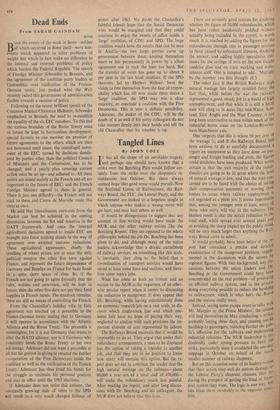Tangled Lines
By JOHN COLE
ITT has all the shape of an inevitable tragedy, perhaps one should have known that a strike over the Beeching Plan would follow cer- tainly from the strike over the shopmen's re- dundancies last October. But there always seemed hope that good sense would prevail. Now the National Union of Railwaymen, the Rail- ways Board, the TUC, the Labour Party, and the Government are locked in a hopeless tangle in which anyone who makes a wrong move will get hurt, and may hurt others as well.
It would be disingenuous to suggest that any amount of fine writing would have made the NUR and the other railway unions like the Beeching Report. They are opposed to the whole philosophy behind the job Dr. Beeching has been given to do, and although many of the union leaders acknowledge that a drastic curtailment of railway services, on something like this scale, is inevitable, they cling to the belief that a co-ordination of transport services would have saved at least some lines and stations, and there- fore some men's jobs.
What has come as both an irritant and an excuse to the NUR is the vagueness of an other- wise precise report when it comes to discussing the reduction in manpower. It does appear that Dr. Beeching, while having ostentatiously done an economic research job on a vast scale, to dis- cover which single-track line and which one- horse halt have no hope of paying their way, neglected to analyse with such precision the im- portant element of cost represented by labour.
The Railways Board maintain that it would be impossible to do so. They argue that under their redundancy arrangements, a man to be displaced has the option of taking a transfer to another job, and that they are in no position to know how many will exercise this option. But the re- port does set out to convince the reader that the high natural wastage on the railways—about 80,000 a year out,of a total staff of 470,000— will make the redundancy much less painful. After reading the report, and after long discus- sions with Dr. Beeching and his colleagues, the NUR does not believe that this is so. There are certainly good reasons for doubting whether the figure of 70,000 redundancies, which has been rather assiduously peddled without actually being included in the report, is worth much. It is reached by adding the figures for the redundancies through cuts in passenger services to those caused by subsequent closures, doubling the answer, and adding highly speculative esti- mates for the savings of men on the new freight sundries plan and on train working and main- tenance staff. One is tempted to add: 'MultiplY by the number you first thought of.') The sober fact is that British Railwa)s- high natural wastage has largely resulted from the fact that, while before the war the railways represented a good, steady job in a world of high unemployment, and that while it is still a berth men will cling to in areas like mid-Wales, Scot- land, East Anglia and the West Country. it has long been unattractive to men within reach of the industrial boom areas on the London-Birming- ham-Manchester axis.
One suspects that this is where 90 per cent of the wastage is, and if. the Railways Board had been anxious to do as carefully documented a report on manpower as they have done on pas- senger and freight loading and costs, the figures could doubtless have been produced. What seems certain is that the vast majority of the redun- dancies are going to be in areas where the level of natural wastage is low, and that the men con- cerned are to be faced with the choice of taking their compensation payments or moving their homes to areas where railway employment is not regarded as a plum job. It seems improbable that, among the younger men at least, man) of those who move will stay in the railways. The likeliest result is that the actual reduction iand so total staff, while spread over several years anu so avoiding the sharp impact on the public mind, will be very much larger than anything the Rail' ways Board cares to admit.
It would probably have been better if the re: port had contained a precise and detail examination of the manpower problem, stiPPle- mented in the discussions with the unions bY regional figures. With that background, any dis" cussions between the union leaders and Dr.
Beeching or the Government could have been concentrated on the real problem—of producing an efficient railway system, and in the process doing everything possible to reduce the hardshiP to railwaymen, which is what both the Board and the unions really want. Instead, saving some escape route in talks with Mr. Marplcs or the Prime Minister, the unicas will find themselves in May conducting a strihe! probably lasting three days, and causing untold hardship to passengers, reducing further the pub" lie's affection for the railways and embittering industrial relations. The NUR leadership is un' doubtedly under strong pressure to have rhe strike, particularly since it conducted the one-da._Y stoppage in October on behalf of the ninea smaller number of railway shopmen. But on this occasion some of its leaders reali.se that their action may well do serious damage t° the Labour Party's electoral chances, thus re- ducing the prospect of getting the kind of trans-. port system they want. The logic is one way, hut fate leads them inevitably in the opposite direc- tion.


































 Previous page
Previous page